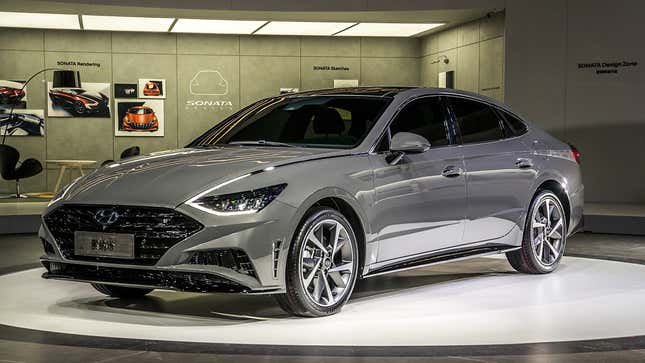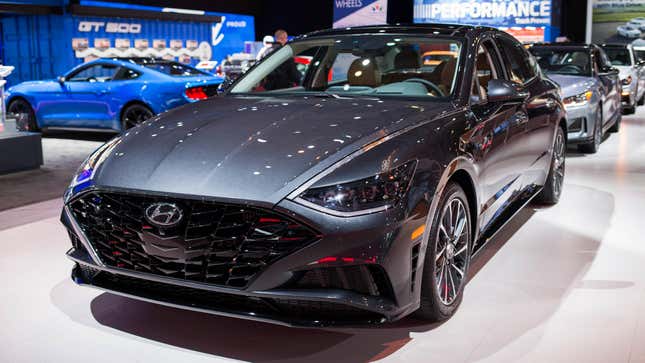
This weekend during the Nurburgring 24, I was afforded some time to speak with the local German car company Hyundai and two of its executives, Albert Biermann, Head of R&D for Hyundai, Kia, and Genesis, and Thomas Schemera, Head of Global Product Strategy & Design for Hyundai, Kia, and Genesis. Both of these gentlemen are former BMW execs who made the transition to the Korean brands, and their influence has already been seen in many ways, including the addition of the Hyundai N performance car sub-brand. It was pretty clear that both are enthusiastic about the work they are doing, and it was an excellent opportunity to hear about the future of Hyundai straight from the source.
So, the context of all this discussion is that there is a 24 hour race going on outside the window, there are four American car writers sitting in round table with each Hyundai exec individually. We ostensibly had 10 minutes to ask whatever we wanted to know about the future of Hyundai, though that stretched into 30 minutes plus for both of them, annnnnnnd go...
(Full Disclosure: Hyundai brought me to Germany to watch its Veloster N and i30N race cars take on the field, do a bit of test driving in some road cars, and eat and stay gratis.)
Here’s everything I learned spending an hour with Albert Bierman and Thomas Schemera.
Hyundai Isn’t Giving up on Sedans

I am personally a big fan of sedans, hatchbacks, and wagons, but there are fewer of them seemingly every day. Instead of kicking them to the curb, Hyundai has doubled down on sedans, giving us a new Accent just last year, and a new Sonata this year.
Thomas Schemera: “If you ask my personal opinion, [Ford, FCA, etc. dropping sedans in favor of SUVs and CUVs] is a big mistake. Everybody is going now for SUVs, everybody thinks that the market for sedans is going down.
Our way of thinking is maybe to differentiate the sedans a little bit more in detail. Think about rugged style. If the look and feel of sedans is different, you make the difference.
How boring is life if you just see SUVs on the road? This is boring.
And everybody thinks ‘OH, forget about sedans! This doesn’t work!’ They have to put more brain into it, you know? Yeah, to make the difference. Maybe to design, to compose, or to interpret a sedan more differently. The space and utilization of a sedan is from my point of view also unbeatable. This is a nice thing.”
Hyundai Says Performance EV is in the Cards

In addition to sedans, I love electric cars. They’re so nice and easy to drive, and the performance can be killer. I drove the standard Ioniq last week, and while it was perfectly competent as a commuter, it didn’t really set my soul on fire. Hyundai might have a way to change that.
To prove the concept of a performance EV sedan, Hyundai popped the 201 horsepower 291 lb-ft motor from the KONA into the Ioniq, updated the suspension, gave it a big brake package, and fitted wider sticky tires to turn this normally staid sedan into a performance machine. Then it was entered in the Optima Ultimate Street Car Challenge series. I dig it.
Hyundai is also working with Rimac on a few electric projects, including electric Touring Car racing.
Thomas Schemera: “We already announced this strategic partnership with Rimac, have you heard about this? [Hyundai has joined the roster of manufacturers developing a car for the electric touring car series ETCR next year with Rimac support. The two companies are also allegedly working on a mid-engine EV sports car for the street as well.] It does ring a bell from my point of view. We are heading forward, not just for high performance, but also to learn for production cars as well.
I guess at the current point of time, in terms of ICE conventional powertrains, these things have an advantage, but it will be reduced very dramatically in the future to come. We are going to stick with our philosophy, there’s no doubt about it, “fun to drive” is our focus. But you can do it with alternative powertrains as well. Be it a BEV or fuel cell. And this is exactly what our company is now very concentrated on accomplishing.”
Albert Biermann: “First of all, we need to prepare for a time where by regulation and laws we cannot put the traditional race cars out anymore. So we have to do something to keep racing, right? That is job number one. We are preparing to do that.
A battery electric race car, you can really go into the cities and make a good show. You saw the WTCR cars, right? You can give a show. If it’s battery electric or not, okay the sound isn’t there, but I think our touring car racing, this is true racing. Fighting like crazy. That also goes with battery electric.
I’m quite optimistic that those [E-WTCR] races will also be very enjoyable. We need to go into this. Our car will run this year for the first time. Let’s see how we can move on with E-WTCR. We want to support E-WTCR, clearly. We made that commitment. Let’s see how much fun we can squeeze out of battery electric racing.”
Just the night before talking to Albert, I test drove a couple of hours in an i30 N and an Ionic EV. So, I asked if an Ionic N is in the pipeline.
“Yeah, we had already a concept car, our U.S. tech office, they made a fancy Ioniq. They tuned it a little bit. Did some autocross or something? [He’s talking about the Ioniq that Hyundai raced in Optima Ultimate Street Car Challenge, shown below.] And we also have a concept car in Namyang, we tuned it. I wouldn’t call it an N. But yeah, we are testing the waters.
Yeah, I mean, sooner or later there will be a battery-electric N. It’s just a matter of time. But then there’s a time maybe when that is even over. And then there will probably be a fuel cell electric N. That depends. If we keep in small segments then maybe battery electric is still the right way to go. When we talk about larger cars, SUVs, we have to go fuel cell electric.”
Hyundai Says Nürburgring Production Car Lap Records are Useless

Man, from my perspective Hyundai is singing all the right tunes. I vastly prefer to value driver confidence and driving enjoyment over the search for ever lower lap times. While Renault is happy to grab headlines by bolting sticky tires and crazy suspension to a hatchback, it’s probably a quick but not very easy to drive hot hatch. There’s a tipping point where lap times make a car unusable for street driving. It is for that reason I feel Nürburgring lap times are meaningless.
Albert Biermann: “We come here [to the Nürburgring] and we do all the tuning here. For us, this is kind of our living room with our cars. We know the area very well, the i30 N has got tons of laps on the Nürburgring not only for durability, but also for tuning.
The aero setup, the aero balance, we have probably the most fancy wind tunnel money can buy, and you get all the data, and you get the recommendations for aerodynamic efficiencies and everything. But the final decision we make in Schwedenkreuz [widely considered the trickiest corner of the Nordschleife, or at least probably the most dangerous].
Those are the corners where we finally decide about the aero balance. Where the not-so-professional driver can still feel comfortable in that high-speed corner when you go over that little crest and the car becomes light. You want a planted back to feel safe. And not feel scared when the car is everywhere and you get the heartbeat because you are scared. We want the heartbeat because you have fun. This is why we are here.”
Later in the conversation, I asked Mr. Biermann what he thought of hot hatches like the Honda Civic Type-R and Renault Megane RS Trophy-R breaking FWD production car N-ring records. Here’s what he had to say.
“No. For this, we developed the Veloster N and i30 N TCR race cars. This is the job of race cars, to make a fast lap time and to win races. And last year in our first season, we won the world championship in WTCR. I think that statement should be clear enough to everybody.
And a road car is first of all fun to drive. And of course race track capability to enjoy it. But if I make a car for the lap time, that aero setup would be completely different. That makes no sense. We want young people to enjoy the car, and not only very fast driving journalists or hire a race driver who is driving over the kerbs like a maniac with a special suspension setup just to find that other four, five, six seconds to beat some record. That’s not our game. We work for customers, not for media story.
And to win races and lap time making, we have the TCR cars. It’s as easy as that.”
I gotta admit, I agree 100 percent. It’s been proven hundreds of times that eking out the final few seconds of a lap time doesn’t make the car more fun to drive or more engaging. Often the opposite. *coughs* Porsche GT3 RS *coughs*
Toyota Told Hyundai Not to do NASCAR

Hyundai is looking to grow its motorsport endeavors in North America. The Korean manufacturer currently runs a few Veloster N TCR racers with support from Bryan Herta Autosport. There have been discussions on how else to get involved, and NASCAR was mentioned quite a lot for a while.
Thomas Schemera: “Yeah, but this is always associated with a hell of a lot of budget. And we talked to them, and they gave a presentation, and I got invited [to Daytona] and we invited them [to visit Hyundai] and we discussed it, we talked it through. At the end of the day we said at the current point of time it doesn’t make sense.
We also talked to Toyota, in Dallas, we said ‘Hey guys, what’s going on in NASCAR? Let’s put our heads together and let’s share some ideas.’ And they said ‘If we were you guys, does it really make sense?’
You have to get access to the best teams, you need to put a hell of a lot of money on the table, you need to get access to the best drivers. Because this [meaning NASCAR racing] is not about the brand, this is not about the team, this is all about the driver, we were told. And if you want this, and you want to spend this money, and you have the patience to wait this 10 years (or 11 years, or maybe eight years) then do it.”
Schemera then closes this train of thought by reprising Toyota’s advice, “But if we were you...” He then trailed off and gave a typically European shrug.
While I had his ear, I suggested he think about becoming a third engine supplier for IndyCar. This was met with a stroke of the chin and little else. Bryan Herta seemed interested.